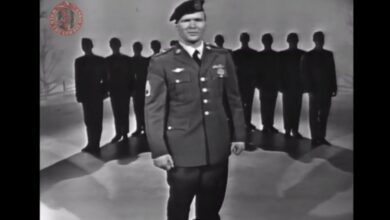This 60-year-old classic outshines modern hits, with Elvis standing unmatched in time.
Elvis Presley’s version of “Return to Sender” marks a significant milestone in rock and roll history, illustrating his remarkable ability to connect with audiences through compelling storytelling and vibrant performances. The song, crafted by the talented songwriting pair Winfield Scott and Otis Blackwell, exemplifies the blend of rhythm and narrative that Presley masterfully navigated. Featuring lively instrumentation and an energetic tempo, “Return to Sender” creates an upbeat ambiance where Elvis’s enthralling vocal style shines, showcasing raw emotion alongside impressive dynamic control. His knack for conveying the essence of a song through profound emotional engagement is especially clear in this classic track.
At its essence, “Return to Sender” tells a story that goes beyond mere romantic misunderstanding; it explores broader themes of love, regret, and the complexities of relationships. The narrative follows a protagonist who receives a letter from an ex-girlfriend, only to find the disheartening stamp “Return to Sender.” This scenario encapsulates feelings of sadness and awareness of past mistakes, resonating with listeners who reflect on their own experiences with love and loss. This relatable narrative elevates the song from simply a catchy tune to an emotionally engaging piece.
Upon its 1962 release, “Return to Sender” swiftly climbed the charts, landing in the top five of the Billboard Hot 100. This rapid ascent not only showcased Presley’s immense popularity as an artist but also underscored his role as a pivotal cultural figure with widespread influence beyond the United States. The song’s universal appeal allowed a diverse audience to connect with its poignant story. Elvis’s captivating charisma and powerful stage presence were instrumental in ensuring his music resonated with listeners from various backgrounds, transforming casual fans into dedicated followers.
Born in Tupelo, Mississippi, in 1935, Elvis Presley became a transformative figure in music history. His rise to fame was propelled by a unique mix of musical influences, including rockabilly, gospel, blues, and country, which coalesced to define his signature sound and reshape the American music scene. Often dubbed “The King of Rock and Roll,” he earned this title not just through his musical brilliance but also for sparking a cultural revolution during the 1950s and beyond. His impressive vocal range and storytelling prowess, evident in tracks like “Return to Sender,” established him as a seminal figure in entertainment.
Elvis’s influence extends well beyond music, leaving a mark on fashion, film, and social culture. He became a trendsetter, inspiring many with his flamboyant outfits and distinctive hairstyles. These contributions further entrenched his status among rock and roll legends, demonstrating that this genre encompassed personal style and attitude as much as the music itself. His performances and public persona resonated profoundly with the youthful spirit of mid-20th century America, positioning him as a symbol of change for a generation seeking self-expression.
The legacy of “Return to Sender” has stood the test of time, with the song being reinterpreted by a wide array of artists across multiple genres. This enduring relevance attests to the track’s timeless nature, as musicians like Bryan Ferry and even The Beatles have put their own unique spins on it, underscoring its versatility. The fact that such iconic artists draw from Presley’s music highlights the lasting impact of his artistry and the themes he explored.
Elvis’s musical essence, exemplified by songs like “Return to Sender,” continues to inspire new generations of artists and fans alike. His focus on storytelling and emotional depth, paired with his innovative performance style, has set a foundational standard for many contemporary musicians. This influence can be seen across various modern genres that emphasize lyricism and emotional connection alongside catchy melodies and engaging performances.
Beyond the music itself, Elvis Presley is celebrated as a cultural icon, whose works invite introspection into personal experiences and the human condition. His extraordinary ability to transcend geographical barriers and resonate with listeners across generations ensures that songs like “Return to Sender” maintain their relevance. The themes of love, regret, and redemption embedded in the lyrics echo universal human experiences, fostering enduring connections.
A closer look at Elvis’s illustrious career reveals that songs such as “Return to Sender” are more than mere nostalgic reflections; they are living expressions of art, authentically reflecting human emotions and experiences. Elvis’s contributions to rock and roll are fundamental, and his narrative-driven approach to music remains a guiding principle for artists aiming to forge meaningful connections through their work.
As time moves on, the emotional impact of Elvis Presley’s music guarantees that he will be remembered not only as a musical innovator but also as a key player in broader cultural conversations. The lasting significance of “Return to Sender” highlights the powerful role of music as storytelling, reinforcing Elvis’s place as a timeless icon whose legacy continues to inspire across generations.





